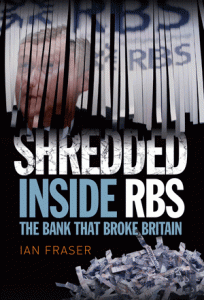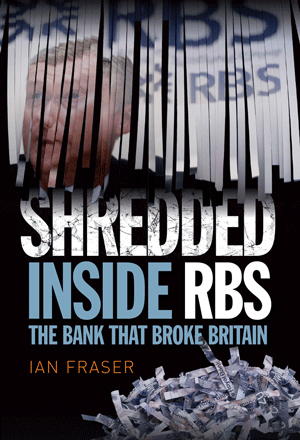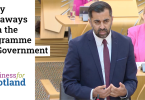 Ian Fraser is an award-winning journalist, commentator and broadcaster who writes about business, finance, politics and economics. Fraser’s new book Shredded: The Rise and Fall of the Royal Bank of Scotland is on sale in bookshops around the country today. Business for Scotland has looked through most of the key chapters this morning and it makes for very uncomfortable reading for Alistair Darling the leader of the beleaguered No Campaign.
Ian Fraser is an award-winning journalist, commentator and broadcaster who writes about business, finance, politics and economics. Fraser’s new book Shredded: The Rise and Fall of the Royal Bank of Scotland is on sale in bookshops around the country today. Business for Scotland has looked through most of the key chapters this morning and it makes for very uncomfortable reading for Alistair Darling the leader of the beleaguered No Campaign.
Ian Fraser agrees with Business for Scotland’s analysis earlier this year that it is increasingly unlikely the £50bn of taxpayers’ money invested by Alistair Darling in RBS will ever be recouped and Darling comes in for severe criticism of his oversight of the financial sector, the RBS bail-out deal in particular and the economy during his tenure as Chief Secretary to the Treasury and Chancellor of the Exchequer. To be fair, so does the Tory-led Coalition Government’s handling of RBS since 2010.
The scope of Darling’s legacy of failure from his time in government is enormous; not just a failure to properly regulate and oversee the financial sector but a hugely negative impact on jobs, investment and economic growth in Scotland. Darling is clearly the last person Scots should be listening to on the economic future of an independent Scotland. Gordon Brown comes off just as badly although, to his credit, it appears that he at least tried to leverage some return for the public’s investment in RBS by way of lending for Small and Medium businesses at affordable rates (not that it ever happened, nor was it enforceable in the deal agreed by Darling).
Here are some key passages from Ian Fraser’s “Shredded”:
“However, the true villains of this piece are the politicians, central bankers, regulators and the Basel Committee on Banking Supervision. Despite his initial attempts to crack down on banker excess via the Cruickshank Report, Brown changed his tune towards banks and bankers in mid 2002. Three years later, seemingly pressurised by bankers, Tony Blair more or less demanded that the already emasculated FSA give up any pretence of trying to regulate the banking sector. From that moment on, banks thought they could get away with virtually anything, whilst defying financial gravity and existing above the law. At a domestic level, it meant morality and ethics could be thrown out the window and we saw the mis-selling of rip-off products on an epic scale – including the scandals of payment protection insurance and interest-rate swap agreements sold to small and medium-size enterprises. The Treasury, the FSA and the Bank of England all turned a deaf ear to the complaints from the banks’ millions of ‘victims’ and paid little heed to the overall balance-sheet strength – their capital, liquidity and asset quality – of banks like RBS. And, at various stages between 1988 and 2008, British politicians also outsourced critical aspects of banking regulation and supervision to the private sector body, the Basel Committee on Banking Supervision, which enabled the bankers to write their own rules. That, in itself, is an error that is easily as bad as any that were committed by Fred Goodwin. So he is right. We can’t just blame it all on him.”
“The government had an unprecedented opportunity to sort out RBS in the aftermath of its October 2008 collapse. It could have fully nationalised RBS and then split it into a ‘good bank’ and a ‘bad bank’, following the model adopted by the Swedish government for its bombed-out banking sector in 1992.That would have permitted a harsher treatment of certain categories of creditors and a much more profound restructuring than was possible under the Labour government’s half-baked bailout. There should have been a more realistic approach to the marking-down of asset valuations, greater honesty and transparency in the way the bank was run and a less vindictive approach to customers whose businesses and lives the bank had inadvertently or wrongfully destroyed.”
“In failing to consider alternative policies along these lines, the governments of both Gordon Brown and David Cameron have let the people of Britain down. The result has been that, at the time of writing, RBS may even be a worse bank than it was under Fred Goodwin and it is certainly a much worse bank than it ever was under George Mathewson and Charles Winter.”
“At the time of writing, one resuscitation programme has, except in purely quantitative terms, largely failed. The approximately £100-billion unfunded liability the bank has for litigation and redress issues remains a massive albatross around its neck. These costs relate to the following five broad areas of alleged criminality and wrongdoing at RBS which, in some cases, date from the late 1990s to the present day:
.(1) the mass ‘mis-selling’ of financial products to unsophisticated customers mainly in the US and UK;
.(2) the mis-selling of mortgaged-backed securities to sophisticated investors in the US;
.(3) the alleged collusion with other global banks in the credit default swap market in the US and Europe;
.(4) the alleged rigging of key financial market benchmarks including Libor, ISDA fix and foreign exchange benchmark rates, which is already proven in the case of Libor and related interbank borrowing rates;
.(5) the alleged duping of investors ahead of a £12.3 billion rights issue in April 2008.
Even with its estimated £250-million-a-year legal budget and truculent approach to litigation, RBS will struggle to bat off these claims.”
“If the right moves are now made, RBS could become a great bank again. If they’re not, I doubt it will even exist in ten years time. Whatever happens, the chances of British taxpayers ever seeing any return on their £45.5 billion investment are close to nil.”
The book demonstrates why the failure of banks was not a Scottish problem – most of the banks in the City of London were in trouble and RBS was rescued because most of its assets were in London and there was a real risk of contagion in the City. This is a point made many times by Business for Scotland.
“At a 3 p.m. meeting on Thursday 9 October, John Kingman, the 39-year-old second permanent secretary to the Treasury, told advisors from Credit Suisse that, unless the bailout was agreed and finalised by 7 a.m. on Monday morning, RBS would go bankrupt. The Credit Suisse team was stunned. If RBS collapsed, Kingman continued, a third of payments would stop, wages would go missing, bills would go unpaid and savings would disappear. It would cause an earthquake of global proportions that would make Northern Rock and Lehman Brothers seem like minor tremors. It would be no good just bailing out RBS, argued the Credit Suisse team, led by James Leigh-Pemberton, the son of a former Bank of England governor. Doing that would simply move the spotlight to other British banks, especially HBOS and Barclays. But Kingman – a former Financial Times journalist, who had taken the lead role at the Treasury because Scholar had been called abroad – told them just to focus on RBS. Other advisors were working on other banks. For the next three days, the offices, meeting rooms and corridors of the second and third floors of the Treasury building were crammed with bankers, lawyers and civil servants working desperately around the clock to try to stave off economic Armageddon.”
 Conclusion
Conclusion
Ian Fraser a leading business journalist and broadcaster has clearly produced an in-depth investigative body of work that lays bare the plethora of mistakes made by the Brown / Darling Government in the lead up to the banking collapse. A theme running through the book is that, not only was the rescue package flawed, but the current Westminster Government seems unable to manage the situation in a way that looks likely to provide a return for the UK taxpayers.
Over-reliance on the volatile financial sector and a blind belief in trickle-down economics took our country to the brink and saddled it with a massive debt burden for generations to come. When the architects of this horrendously flawed “City of London” economic policy ask you to trust that they and not the people of Scotland are best placed to manage Scotland’s finances, just remember it was Brown and Darling who promised you that they had ended the cycle of boom and bust.
Darling and Brown were wrong then and they are wrong now.
Join Business for Scotland – Read More
Support Business for Scotland’s crowdfunder.
Further Reading
Destroying the No Campaign’s bank bail out lies
Why did the Banks only become Scottish when they failed?
Cameron demands apology from Darling








And all Darling’s recent pronouncements on the case for voting No contain little if no facts whatsover. They are all simply empty words and promises. What also gets me is that when they suggest we’d be “better together” what they really mean is that we’d only remain the same as we are, which as we know is relatively poor.
And this morning I hear that Gordon Brown has the cheek to suggest that an Independent Scotland would end up becoming a more unequal society, as if the current state of affairs in Scotland or the UK are anything he can crow about! You couldn’t make this up!
Gordon,
Many, many years ago I did a couple of spots of Economics at Uni but cannot claim to be anything of an economist, thank goodness. What I am reasonably good at is reading accounts and ferreting out the hidden jobbies.
About a year ago, I came about the then latest accounts of Deutsche Bank and buried somewhere at the end was a wee liability figure for the Bank of its dalliance with CDS etc etc. The figure turned out to be about the same as the World GDP! There was a disclaimer that this was an open position, if the Heavens caved in, but that, together with their credit position on the same, in other words the monies they are owed by others, maybe including themselves, it was only about the GDP of Germany.
Tacitly they were admitting that they didn’t have a clue whet they owed to whom and what was owed to to them and by whom, including themselves.
I believe that the Banks are back onto the same old virtual merry-go-round and it is logical to suppose the ultimate outcome of that will be an even “bigger and better” black hole super vortex.
I am coming round to the thinking that we go into the first post Yes meeting to negotiate the divorce package and play the nuclear option. We don’t take any of the UK common assets and none of the debt. Let them keep the Banks.
If we accept a population proportion of the debt, national or assumed, for which we have never been responsible we would be manacling Scotland to to a big iron ball which would suck us into that big black hole faster than ever.
Get out from Sterling, except as a short term bridging necessity, float when the time comes and then convert to a different named currency.
We would need to industrialise pretty damn quickly too.
Thanks for all your work, off and on the ball, all of youse!
I forgot to add, is it true that the national accounting standards will soon be changed to include the off books debt, in PFIs, pension liabilities etc?
If so, would rUK not be playing that card during the debt reallocation negotiations?
I think that hidden debt liability would be greater than the existing published UK debt of £ 1.6 trillion?
If we don’t get out of this madhouse we should make the growing of carrots and potatoes compulsory at parish schools.
As a non economist who’s worked for 30 years designing products I fully agree with boosting Scotland’s manufacturing. I see it as one of the three legs of a modern, developed economy – manufacturing ( generates wealth), services (redistributes wealth) and finance (accumulates and injects wealth). Remove a leg and the whole lot falls over – we’re all living with the result of Thatchers policies now.